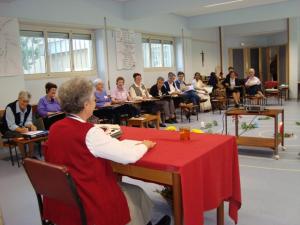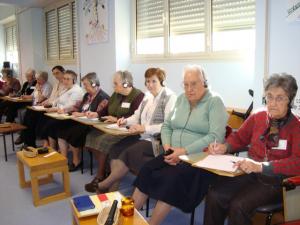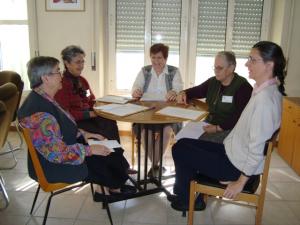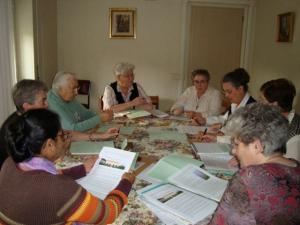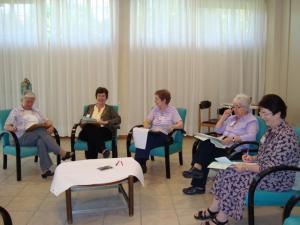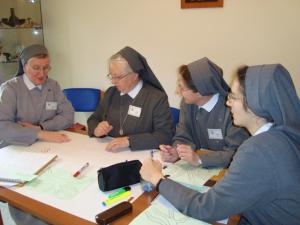Twenty-nine participants – the leadership Teams from Europe, along with the General Leadership Team, gathered in the Conference Hall in the Generalate to begin the fourth Continental Meeting to take place in 2010.
EUROPEAN CONTINENTAL MEETING 2010
Twenty-nine participants – the leadership Teams from Europe, along with the
Twenty nine instead of thirty: Maria Dobrowslava Rogalska had returned to
Margaret MULDOON began by inviting each one to quieten down, and to enter into a few moments of silence. Next came the introductions … One by one, the participants said who they were, what team they belonged to, and then shared some of their feelings and desires:
Taking all the sharing together, the dominant points were hope, trust, desire to live something new…
Margaret’s Opening Words
Margaret opened the meeting on “Leadership for
Our theme, “Leadership for mission” reminds us that we find our meaning, or reason for being in mission. It is the mission that gives direction. It gives meaning and meaning is what motivates people “This new awareness … gives a renewed impetus to commit ourselves with enthusiasm and energy for mission.
Our Constitutions, affirm that the service of authority ensures unity in government which enables the Institute to be faithful to its mission.
Mission is larger and more all-embracing than ministry. If our mission is not clear we will remain unclear in our ministries – if the mission is not clear we may each individually be doing good work according to our personal preference with no reference to the group nor to the fact that it is the mission that must influence the why and how of ministry. Not all forms of ministry are coherent with our call to live communion - God’s mission at the heart of the world. How aware are we that when we are on ministry we are there in the name of and on the behalf of the whole? Is the ministry of one the ministry of all or is it something that is “private” known only to the individual and perhaps the leader. Does our ministry promote and proclaim the mission?
A new consciousness within Religious Life leads to the conviction that there is a great deal more to our life witness than just ministry. Every aspect of our lifestyle – prayer, community, personal giftedness, congregational resources, as well as ministry – contribute to the raison d’être of our existence which is to be people in mission.
This changing consciousness marks a transition in theological self-understanding, in fact, a deepening sense of vocation. In terms of the emerging theology of the vowed life, we seem to be at the early stages of clarifying and naming this transition. The witness required in the name of mission is to the God who co-creates across the entire spectrum of creation, across time and history, forever inviting humans to collaborate in that global and cosmic process of birthing possibilities for new hope.
In order to respond to the call to a new world view we need to contemplate our Trinitarian God, we need to be attentive to the sacred, the mystical, that invites us into a larger view: we need to remember that what we can see is never the whole story and that the sacred will take us beyond whatever story we are telling ourselves. We are invited to be aware of areas where we are blocked, where we believe change is not possible. We are invited to go beyond our fixed ideas, to see what we need to let go off, allowing whatever no longer brings life to die and to facilitate grieving when necessary. To hear again our Founders say to us that we must “adopt new forms and new means” for this new time, is a source of encouragement and an inspiration.

